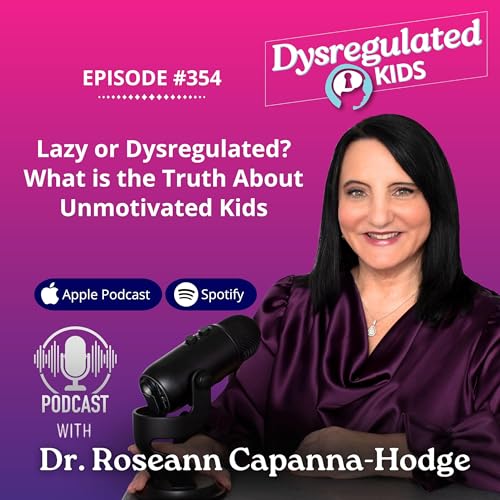
354: Lazy or Dysregulated? What is the Truth About Unmotivated Kids
No se pudo agregar al carrito
Add to Cart failed.
Error al Agregar a Lista de Deseos.
Error al eliminar de la lista de deseos.
Error al añadir a tu biblioteca
Error al seguir el podcast
Error al dejar de seguir el podcast
-
Narrado por:
-
De:
Parenting a child who won’t even try can break your heart. You ask, you remind, you offer rewards—and still, they resist or melt down. You’re not imagining it, and you’re not failing as a parent. It’s not bad parenting—it’s a dysregulated brain.
Many parents worry their child is lazy, unmotivated, or just doesn’t care about school or responsibilities. But what if what’s really happening isn’t laziness at all—what if your child’s brain is shutting down under stress?
In this episode, I explain why motivation struggles often stem from nervous system dysregulation, not defiance, and share practical ways to help your child feel motivated again.
Why does my child resist simple tasks like homework?When kids push back against schoolwork, chores, or routines, parents often assume it’s about attitude or lack of effort. But beneath that resistance is often stress overload.
- Stress shuts down the brain’s control center—the frontal lobe—making focus, planning, and problem solving nearly impossible.
- Even bright kids freeze when their nervous system perceives a task as too hard or threatening.
- “Just try harder” doesn’t work because motivation requires regulation—a calm brain can think and follow through.
- Punishments or charts can’t fix dysregulation; co-regulation and structure can.
When a child melts down before math or avoids starting, think: Their brain can’t, not won’t.
Is my child lazy or is something else happening?Labels like “lazy” or “unmotivated” only feed shame—and shame blocks learning and confidence.
- A child with low self-esteem or repeated failures may fear trying again.
- Shame walls off effort; it turns “I can’t” into “I won’t.”
- Kids who hyperfocus on screens but avoid schoolwork aren’t choosing fun over success—they’re avoiding discomfort.
- When the brain feels unsafe, motivation drops and avoidance rises.
So before assuming your kid doesn’t care, ask: Is their nervous system overwhelmed? Behavior is communication—their resistance is a signal, not defiance.
How can I help my unmotivated child feel successful again?Regulation first. Always. When your child is calm, they can connect, think, and act.
- Start small: Break big tasks into micro steps—one sentence, one problem, one drawer.
- Co-regulate: Sit with your child to launch a task, then fade your support gradually.
- Praise early effort: Catch micro-wins (“I love that you opened your book!”).
- Build predictable routines: Consistency lowers stress and helps kids feel in control.
- Use micro resets: Stretch, hydrate, or breathe between steps to prevent shutdowns.
These small adjustments help your child rebuild motivation, self-belief, and problem-solving skills—without constant power struggles.
Ready to help your child find calm and motivation?
Try my Quick CALM™—a science-backed reset that gives you the essential tools to calm your child’s brain and restore peace in your home.
What can parents do when motivation swings with mood or...

